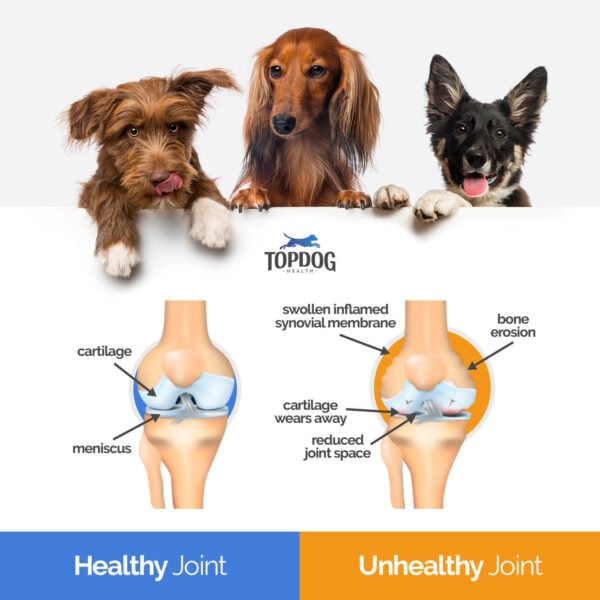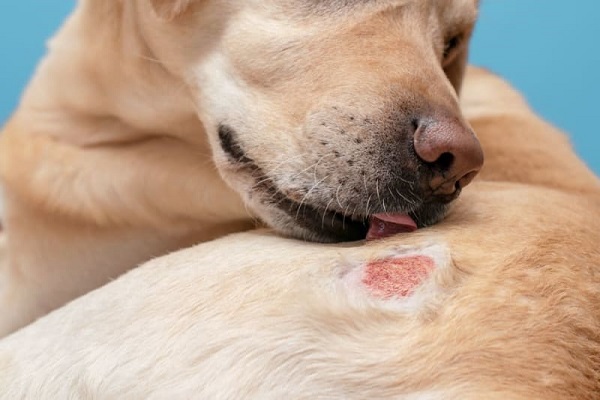Good Ideas On Deciding On Pet Wellbeing Australia
Good Ideas On Deciding On Pet Wellbeing Australia
Blog Article
Omega-3 Fatty Acids: How Do They Help Joint Health?
Omega-3 fatty acids, particularly EPA (eicosapentaenoic) and DHA(docosahexaenoic) is an important role in maintaining joint health in cats and dogs. What they do is:
Anti-inflammatory Properties
Reduced Inflammation
Function: Omega-3 acids are powerful anti-inflammatory agents. They inhibit the production of proinflammatory cytokines, Eicosanoids, and other molecules that contribute to inflammation.
Omega-3s can reduce swelling and pain associated with conditions such as arthritis, by reducing inflammation in the joints. It enhances the quality of life of pets, by increasing their mobility.
Joint Lubrication and Health
Improved joint lubrication
Function Omega-3 acids are vital for the maintenance of synovial fluid which lubricates your joints.
Benefits: A better lubrication system means smoother joint movement and less friction. This can reduce wear and tear on the cartilage. This is especially beneficial for pets who have joint problems or might develop one.
Cartilage Protection and Repair
Cartilage Protection:
Function: Omega-3s improve the health of cartilage by decreasing the activity of enzymes that breakdown cartilage.
Benefits: Preventing cartilage destruction helps preserve joint integrity and reduce the risk of joint disorders like osteoarthritis.
Immune System Support
Immune System Regulation:
Function: The omega-3 fatty acid helps to regulate the immune system. It also promotes an inflammation response that is well-balanced.
Benefits: A healthy immune system that is properly controlled will help in reducing joint pain. This will prevent excessive joint pain and joint injuries.
Comfort and mobility are enhanced
Improved Mobility
Omega-3s ease inflammation and protect joint structures to help pets move more easily.
Benefits Numerous pets, especially older pets or those with arthritis show less pain and better mobility. This leads to a happier and more active life.
Additional Health Benefits
Overall Health
Function Omega-3 fatty acids aid in skin, cardiovascular and coat health. These can contribute to the overall health and well-being of pets.
Benefits : A healthy pet will likely be more energetic and have healthier joints over time.
Use and Considerations
Dosage administration, dosage and dosing: The amount of Omega-3s recommended for your pet is based on its size, weight and health issues. It is important to follow the veterinarian's recommendations or the product label instructions.
Sources of Omega-3s High-quality fish oil supplements are a popular source of EPA and DHA. To ensure safety and efficacy, it's important to select products that are specifically formulated for pets.
Omega-3 supplements can cause side consequences. Some pets experience issues with digestion or breath that is fishy. If you start with a small dosage and gradually increasing it, you can minimize any adverse effects.
Conclusion
Omega-3 fatty acid is highly beneficial to joint health of pets and canines. The anti-inflammatory properties of omega-3 fatty acids, their capacity to improve joint lubrication, protect cartilage, and support the immune system contribute to improved joint function and decreased discomfort. Regular supplementation will improve mobility of pets and promote the healthy life. View the most popular natural dog probiotics for website examples including pet rhodiola supplements, pet supplements for pets with fear of being alone, pet vitamins australia, herbal medicines for dogs and cats, pet brain supplements, pet supplements for pets with skin tumors, mcdowells herbal, pet licorice supplements and more.
Coconut Oil Can Help Dogs And Cats Suffering From Skin Allergies.
Coconut oil, which is moisturizing in addition to anti-inflammatory and healing, can aid pets suffering from skin allergies. This is how coconut oil can aid pets suffering from allergies to the skin:
Moisturizing Properties
Skin Hydration
Coconut oil is moisturizing for the skin.
Benefits It assists in hydrating dry skin and flaky skin. It also reduces itchiness. This is particularly useful for pets suffering from allergic dermatitis which typically causes dry and itchy skin.
Anti-inflammatory Action
Reduce Inflammation
Coconut oil is a source of a chemical called lauric Acid. This acts as an anti-inflammatory.
Applying coconut oil to damaged skin can ease inflammation, redness and discomfort. It can provide relief to pets suffering from allergic reactions.
Antimicrobial Activities
Fighting Infections
Function: Caprylic and lauric acids found in coconut oils possess antimicrobial qualities that help combat bacteria, viruses, and fungi.
Coconut oil can help in treating secondary skin infection that can occur from scratching or irritation caused by allergies. This can help maintain general skin health and also preventing any further problems.
Healing and Relaxation
Promoting Healing
The function: Coconut oil supports the skin's natural healing process.
Benefits: It helps to heal minor cuts, abrasions or hot spots that are caused by excessive scratching. This can help to accelerate the healing process for skin damage caused by allergies.
Barrier Protection
Enhancing Skin Barrier:
Coconut oil strengthens the natural barrier of skin.
Benefits: A thicker skin barrier guards against environmental irritants and allergens, reducing the likelihood of skin infections.
Dietary Supplements
Internal Benefits
Use: Coconut oil can also be taken orally as nutritional supplement.
It promotes healthy skin when consumed. Its anti-inflammatory and antimicrobial qualities can aid in reducing inflammation throughout the body and enhance the immune system of your pet, potentially reducing the incidence of skin allergies.
Considerations for Use
Topical Application Coconut oil can be applied directly to the area of the skin. Massage gently to absorb it. It is possible to repeat the process once or even twice daily according to the condition of your skin.
Coconut oil can be included directly in pet food. The standard dose for coconut oil is one teaspoon for every 10 lbs of body weight. However, it is essential to start with a small amount and increase it gradually to ensure that there is no stomach upset.
Coconut Oil Quality - Use organic virgin coconut oils which are not contaminated with preservatives or additives.
Monitoring for Reactions: While coconut oil is generally safe, it is important to monitor your pet for any adverse reactions, like vomiting or diarrhea when it is consumed, and skin irritation when applied topically.
If you want to know more about this subject Please click here.
Coconut oil can provide an effective natural remedy for skin allergies that can affect both cats and dogs. Its moisturizing and anti-inflammatory healing, and antimicrobial properties aid in soothing and protecting the skin, decrease itching and inflammation, as well as help improve the overall health of your skin. Regularly applying coconut oil to pet's skin can alleviate symptoms of allergies for pets. Have a look at the top kidney failure in dogs for more info including pet echinacea supplements, kidney support gold, pet calming supplements, pet supplements for pets with fear of grooming tools, pet supplements for pets with food sensitivities, pet glucosamine-chondroitin supplements, pet skin and coat care, pet supplements for pets with epilepsy and more.
How Are Dog And Cat Getting Rid Of Yeast Infections By Apple Cider Vinegar?
ACV can be utilized as a remedy for yeast infections in dogs and cats. Although there's evidence and a few studies that suggest its potential benefits but it's crucial to use ACV with caution and under medical supervision due to its acidic character and potential negative side negative effects. ACV assists in treating yeast infections.
Antifungal Properties
Acidic Environment
The acidity of ACV is between 2.5-3.0 pH. The acidic pH can hinder yeast growth.
Benefits The benefits of applying ACV topically on your pet or adding it in their bath water will help to decrease the growth of yeast on the skin.
Skin pH Regulation
Balancing Skin pH:
The function: ACV is believed to assist in the balance of pH levels, which may help support the health of the skin barrier and reduce yeast growth.
Benefits: Keeping a healthy pH levels in the skin can help prevent yeast infections, and enhance overall health of the skin.
Anti-inflammatory Effects
The reduction of inflammation
ACV is moderately anti-inflammatory.
Benefits of reducing inflammation It can help reduce the symptoms of yeast infections, such as itching, redness and discomfort.
Support for Digestive Health
Internal Use
ACV may promote digestive health, and help balance the gut bacteria after ingesting.
Benefits of a healthier gut environment: By supporting the immune system and maintaining microbial equilibrium, a healthier gut can limit yeast overgrowth.
Use and considerations
Topical Use: Dilute it with water (typically 1-2 parts ACV per 1 part water) and apply a spray to affected ears or skin. Do not apply it to damaged skin and open wounds.
Internal Use - If you're considering using ACV for internal use, consult your veterinarian first. ACV should always be diluted with water (e.g. 1 teaspoon or 1 tablespoon per cup) and taken in small dosages.
If you apply ACV topically, be on the lookout for indications of irritation and allergic reactions. Do not use it if you notice any negative effects.
Consultation with a Veterinarian: Prior to making use of ACV to treat yeast infections in animals, it's important to consult with a veterinarian. They can give advice regarding proper dilution as well as application methods and possible risks depending on your pet's particular health requirements.
Conclusion
Apple cider vinegar is utilized to treat yeast infections in dogs and cats However, it should be performed under the supervision of a vet. Acidity in ACV may create a toxic conditions for yeast to grow on ear and skin as well as provide some mild anti-inflammatory properties. However, proper dilution and careful application are crucial to avoid irritation or negative reactions. ACV is effective and safely by following instructions from a vet as part of an overall treatment plan for treating yeast diseases in dogs. Check out the most popular probiotics for dogs url for more advice including pet lemon balm supplements, pet supplements for pets with fear of being alone, pet licorice supplements, pet lactation supplements, pet supplements for shelter pets, pet supplements for pets with obsessive licking, pet skullcap supplements, pet supplements for pets with obsessive licking and more.